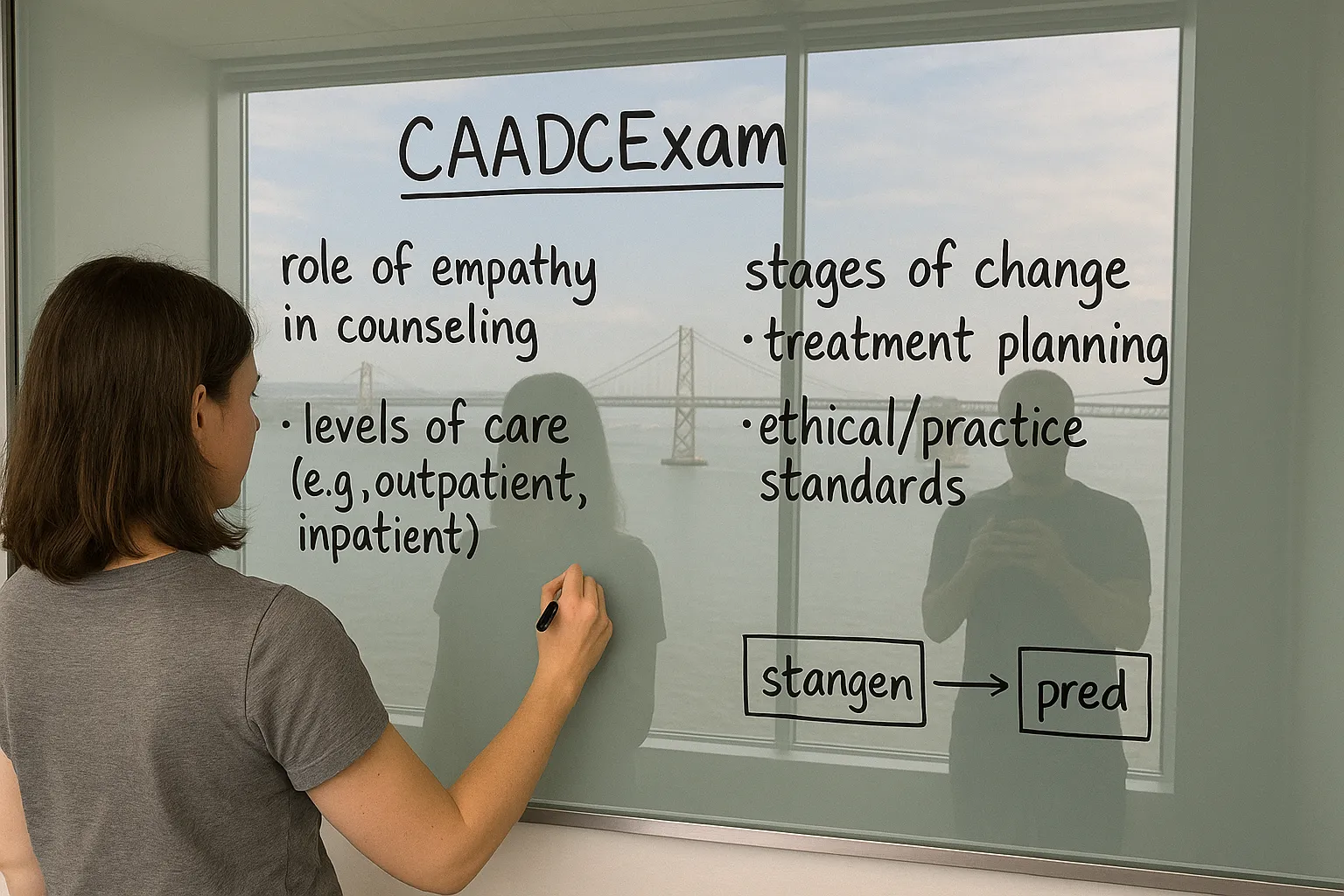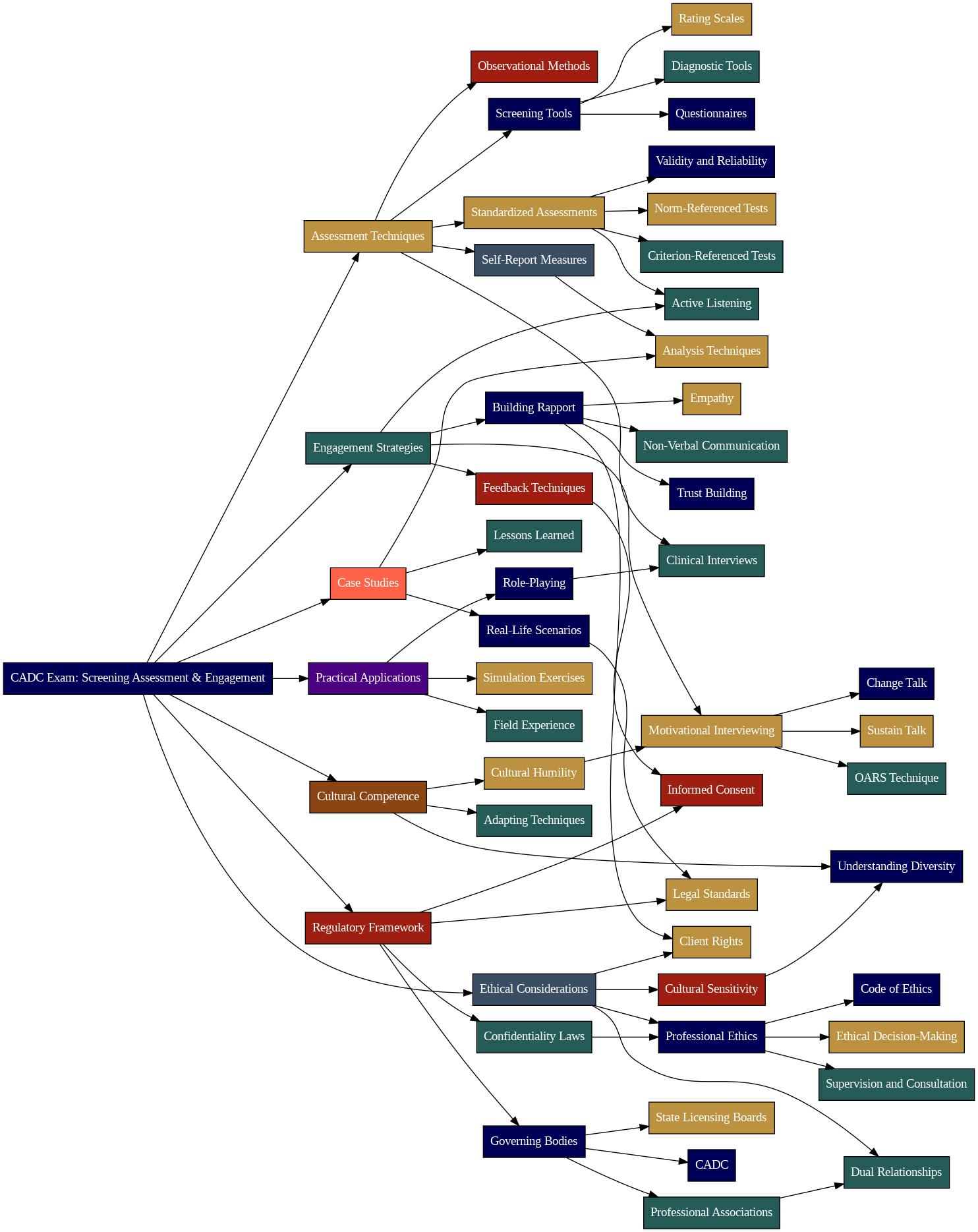Quiz-summary
0 of 28 questions completed
Questions:
- 1
- 2
- 3
- 4
- 5
- 6
- 7
- 8
- 9
- 10
- 11
- 12
- 13
- 14
- 15
- 16
- 17
- 18
- 19
- 20
- 21
- 22
- 23
- 24
- 25
- 26
- 27
- 28
Information
Premium Practice Questions
You have already completed the quiz before. Hence you can not start it again.
Quiz is loading...
You must sign in or sign up to start the quiz.
You have to finish following quiz, to start this quiz:
Results
0 of 28 questions answered correctly
Your time:
Time has elapsed
Categories
- Not categorized 0%
- 1
- 2
- 3
- 4
- 5
- 6
- 7
- 8
- 9
- 10
- 11
- 12
- 13
- 14
- 15
- 16
- 17
- 18
- 19
- 20
- 21
- 22
- 23
- 24
- 25
- 26
- 27
- 28
- Answered
- Review
-
Question 1 of 28
1. Question
A Kentucky LCADC, during an initial assessment with a new client named Benicio, explains the proposed treatment plan, including group therapy and individual counseling sessions. Benicio nods and says, “Okay, that sounds fine.” The counselor proceeds with treatment without further discussion. Which ethical principle has the counselor MOST likely violated?
Correct
Kentucky’s regulations governing LCADCs emphasize client autonomy in treatment decisions, aligning with ethical principles of self-determination. Informed consent is a cornerstone of this autonomy, requiring counselors to provide clients with comprehensive information about the nature of treatment, potential risks and benefits, alternative approaches, and their right to refuse or withdraw from treatment at any time. This process is not merely a formality but an ongoing dialogue, ensuring the client’s active participation in shaping their recovery journey. The counselor must ensure the client understands the information presented, tailoring it to their cognitive abilities and cultural background. Furthermore, Kentucky law requires specific documentation of the informed consent process, including the client’s signature and date, acknowledging their understanding and agreement. Scenarios involving minors or individuals with impaired decision-making capacity necessitate additional considerations, such as obtaining consent from legal guardians or designated representatives, while still prioritizing the client’s assent to the greatest extent possible. Counselors must also be aware of the potential for coercion or undue influence, particularly in mandated treatment settings, and take steps to safeguard the client’s voluntary participation. The failure to obtain adequate informed consent can expose the counselor to legal liability and ethical sanctions, underscoring the critical importance of this process in protecting client rights and promoting ethical practice.
Incorrect
Kentucky’s regulations governing LCADCs emphasize client autonomy in treatment decisions, aligning with ethical principles of self-determination. Informed consent is a cornerstone of this autonomy, requiring counselors to provide clients with comprehensive information about the nature of treatment, potential risks and benefits, alternative approaches, and their right to refuse or withdraw from treatment at any time. This process is not merely a formality but an ongoing dialogue, ensuring the client’s active participation in shaping their recovery journey. The counselor must ensure the client understands the information presented, tailoring it to their cognitive abilities and cultural background. Furthermore, Kentucky law requires specific documentation of the informed consent process, including the client’s signature and date, acknowledging their understanding and agreement. Scenarios involving minors or individuals with impaired decision-making capacity necessitate additional considerations, such as obtaining consent from legal guardians or designated representatives, while still prioritizing the client’s assent to the greatest extent possible. Counselors must also be aware of the potential for coercion or undue influence, particularly in mandated treatment settings, and take steps to safeguard the client’s voluntary participation. The failure to obtain adequate informed consent can expose the counselor to legal liability and ethical sanctions, underscoring the critical importance of this process in protecting client rights and promoting ethical practice.
-
Question 2 of 28
2. Question
A Kentucky LCADC is transitioning from private practice to a position at a community mental health center. What is the LCADC’s PRIMARY responsibility regarding client records, according to Kentucky regulations and ethical guidelines?
Correct
Kentucky’s administrative regulations require LCADCs to maintain client records for a minimum of five years after the termination of services or, if the client is a minor, for five years after the client reaches the age of majority (18). These records must be stored securely and confidentially, protecting client privacy. The regulations also specify the types of information that must be included in the client record, such as assessment data, treatment plans, progress notes, and informed consent documents. Furthermore, LCADCs must adhere to HIPAA regulations regarding the privacy and security of protected health information (PHI). Clients have the right to access their records, and counselors must have a process in place for responding to client requests for access or amendment of their records. Proper record-keeping is essential for ethical and legal compliance, as well as for providing quality care.
Incorrect
Kentucky’s administrative regulations require LCADCs to maintain client records for a minimum of five years after the termination of services or, if the client is a minor, for five years after the client reaches the age of majority (18). These records must be stored securely and confidentially, protecting client privacy. The regulations also specify the types of information that must be included in the client record, such as assessment data, treatment plans, progress notes, and informed consent documents. Furthermore, LCADCs must adhere to HIPAA regulations regarding the privacy and security of protected health information (PHI). Clients have the right to access their records, and counselors must have a process in place for responding to client requests for access or amendment of their records. Proper record-keeping is essential for ethical and legal compliance, as well as for providing quality care.
-
Question 3 of 28
3. Question
A Kentucky-licensed Clinical Alcohol and Drug Counselor (LCADC) is providing telehealth services to a client. During a session, the LCADC discovers the client has temporarily relocated to another US state due to a family emergency. According to Kentucky regulations and ethical guidelines for LCADCs, what is the MOST immediate and critical consideration for the counselor regarding the continuation of telehealth services?
Correct
In Kentucky, LCADCs operate under specific regulations regarding telehealth, especially concerning client location. Kentucky Revised Statutes (KRS) 205.631 outlines provisions for telehealth services, requiring practitioners to adhere to the same standards of care as in-person services. The location of the client during a telehealth session is crucial because Kentucky licensure laws dictate that services are provided within the scope of Kentucky regulations. If a client is physically located outside of Kentucky during a telehealth session, the LCADC may be practicing without proper authorization in that other state, potentially violating its licensing laws. Exceptions might exist if the other state has specific telehealth reciprocity agreements or waivers, but generally, the practitioner must ensure compliance with the laws of the jurisdiction where the client is located. Additionally, the Kentucky Board of Alcohol and Drug Counselors may have specific guidance or rulings on this issue, which LCADCs are expected to follow. Ethical considerations also play a role, as the counselor must ensure they are competent to provide services to a client who may be subject to different cultural norms or legal frameworks in another state. The counselor’s professional liability insurance might also not cover services provided to clients outside of Kentucky without proper endorsements. Therefore, the primary concern is whether the LCADC is authorized to practice in the jurisdiction where the client is physically present during the telehealth session.
Incorrect
In Kentucky, LCADCs operate under specific regulations regarding telehealth, especially concerning client location. Kentucky Revised Statutes (KRS) 205.631 outlines provisions for telehealth services, requiring practitioners to adhere to the same standards of care as in-person services. The location of the client during a telehealth session is crucial because Kentucky licensure laws dictate that services are provided within the scope of Kentucky regulations. If a client is physically located outside of Kentucky during a telehealth session, the LCADC may be practicing without proper authorization in that other state, potentially violating its licensing laws. Exceptions might exist if the other state has specific telehealth reciprocity agreements or waivers, but generally, the practitioner must ensure compliance with the laws of the jurisdiction where the client is located. Additionally, the Kentucky Board of Alcohol and Drug Counselors may have specific guidance or rulings on this issue, which LCADCs are expected to follow. Ethical considerations also play a role, as the counselor must ensure they are competent to provide services to a client who may be subject to different cultural norms or legal frameworks in another state. The counselor’s professional liability insurance might also not cover services provided to clients outside of Kentucky without proper endorsements. Therefore, the primary concern is whether the LCADC is authorized to practice in the jurisdiction where the client is physically present during the telehealth session.
-
Question 4 of 28
4. Question
According to the DSM-5 criteria for Substance Use Disorders, a client who reports experiencing strong cravings for opioids, needing to take increasingly larger doses to achieve the same effect, and repeatedly attempting to cut down on their use without success, would be demonstrating symptoms primarily related to which diagnostic category?
Correct
The DSM-5 outlines specific diagnostic criteria for Substance Use Disorders (SUDs), which include impaired control, social impairment, risky use, and pharmacological criteria (tolerance and withdrawal). Impaired control refers to using more of the substance than intended, unsuccessful efforts to cut down, spending a great deal of time obtaining the substance, and craving. Social impairment involves failure to fulfill major role obligations, continued use despite social or interpersonal problems, and giving up important activities. Risky use includes recurrent use in hazardous situations and continued use despite knowledge of having a physical or psychological problem caused by the substance. Tolerance is defined as needing more of the substance to achieve the desired effect, and withdrawal is a characteristic syndrome that occurs when substance use is decreased or stopped. The severity of the SUD is determined by the number of criteria met: 2-3 criteria indicate a mild SUD, 4-5 indicate a moderate SUD, and 6 or more indicate a severe SUD. The diagnosis should be specific to the substance being used (e.g., Alcohol Use Disorder, Opioid Use Disorder).
Incorrect
The DSM-5 outlines specific diagnostic criteria for Substance Use Disorders (SUDs), which include impaired control, social impairment, risky use, and pharmacological criteria (tolerance and withdrawal). Impaired control refers to using more of the substance than intended, unsuccessful efforts to cut down, spending a great deal of time obtaining the substance, and craving. Social impairment involves failure to fulfill major role obligations, continued use despite social or interpersonal problems, and giving up important activities. Risky use includes recurrent use in hazardous situations and continued use despite knowledge of having a physical or psychological problem caused by the substance. Tolerance is defined as needing more of the substance to achieve the desired effect, and withdrawal is a characteristic syndrome that occurs when substance use is decreased or stopped. The severity of the SUD is determined by the number of criteria met: 2-3 criteria indicate a mild SUD, 4-5 indicate a moderate SUD, and 6 or more indicate a severe SUD. The diagnosis should be specific to the substance being used (e.g., Alcohol Use Disorder, Opioid Use Disorder).
-
Question 5 of 28
5. Question
A Kentucky LCADC, Marcus, is providing counseling to a client, John, who is also a member of the same Alcoholics Anonymous (AA) group that Marcus attends. Marcus and John occasionally socialize at AA meetings and have developed a friendly rapport. What ethical concern should Marcus be MOST aware of in this situation?
Correct
Dual relationships and boundaries are critical ethical considerations for Kentucky LCADCs. A dual relationship occurs when a counselor has a professional relationship with a client and also has another relationship with that person, such as a friendship, business partnership, or romantic involvement. Dual relationships are generally discouraged because they can compromise the counselor’s objectivity, create conflicts of interest, and exploit the client. Boundaries define the limits of the therapeutic relationship and help to maintain a safe and professional environment. Boundary crossings are minor deviations from traditional boundaries that may be harmless or even helpful in some situations, while boundary violations are serious breaches of ethical conduct that can cause harm to the client. Kentucky’s Board of Alcohol and Drug Counselors emphasizes the importance of maintaining clear boundaries and avoiding dual relationships whenever possible. Counselors must carefully consider the potential risks and benefits of any boundary crossing and document their rationale in the client’s record. If a dual relationship is unavoidable, the counselor must take steps to minimize the potential for harm, such as obtaining informed consent, seeking supervision, and maintaining clear boundaries. The ACA Code of Ethics provides specific guidance on dual relationships and boundaries, emphasizing the importance of protecting the client’s welfare and avoiding exploitation.
Incorrect
Dual relationships and boundaries are critical ethical considerations for Kentucky LCADCs. A dual relationship occurs when a counselor has a professional relationship with a client and also has another relationship with that person, such as a friendship, business partnership, or romantic involvement. Dual relationships are generally discouraged because they can compromise the counselor’s objectivity, create conflicts of interest, and exploit the client. Boundaries define the limits of the therapeutic relationship and help to maintain a safe and professional environment. Boundary crossings are minor deviations from traditional boundaries that may be harmless or even helpful in some situations, while boundary violations are serious breaches of ethical conduct that can cause harm to the client. Kentucky’s Board of Alcohol and Drug Counselors emphasizes the importance of maintaining clear boundaries and avoiding dual relationships whenever possible. Counselors must carefully consider the potential risks and benefits of any boundary crossing and document their rationale in the client’s record. If a dual relationship is unavoidable, the counselor must take steps to minimize the potential for harm, such as obtaining informed consent, seeking supervision, and maintaining clear boundaries. The ACA Code of Ethics provides specific guidance on dual relationships and boundaries, emphasizing the importance of protecting the client’s welfare and avoiding exploitation.
-
Question 6 of 28
6. Question
Javier, a client at a substance abuse treatment center in Kentucky, is participating in a court-mandated treatment program following a DUI conviction. The court order stipulates that the treatment center must provide regular progress reports to the court. Javier’s counselor is preparing the first progress report. Which of the following actions best balances the ethical obligations of client confidentiality with the legal requirements of the court order, according to Kentucky regulations and ethical guidelines for LCADCs?
Correct
In Kentucky, the Kentucky Board of Alcohol and Drug Counselors governs the practice of LCADCs. Kentucky Revised Statutes (KRS) Chapter 309 outlines the regulations concerning licensed professional counselors, including those specializing in alcohol and drug counseling. Specifically, KRS 309.080 addresses unprofessional conduct, which includes violating client confidentiality. Furthermore, 201 KAR 36:060 details the ethical standards for Kentucky LCADCs, emphasizing the importance of maintaining client confidentiality except when legally mandated, such as in cases of suspected child abuse or neglect, or when a client poses an imminent threat to themselves or others. HIPAA also mandates privacy rules related to healthcare information. The scenario involves a client, Javier, who is participating in court-mandated substance abuse treatment. The court order explicitly requires progress reports to be submitted. The counselor, therefore, has a legal obligation to provide these reports, even though doing so involves disclosing confidential information. However, the counselor must only disclose information directly relevant to the court’s request, such as attendance, participation, and progress towards treatment goals. Disclosing extraneous personal details not pertinent to the treatment mandate would be a breach of confidentiality.
Incorrect
In Kentucky, the Kentucky Board of Alcohol and Drug Counselors governs the practice of LCADCs. Kentucky Revised Statutes (KRS) Chapter 309 outlines the regulations concerning licensed professional counselors, including those specializing in alcohol and drug counseling. Specifically, KRS 309.080 addresses unprofessional conduct, which includes violating client confidentiality. Furthermore, 201 KAR 36:060 details the ethical standards for Kentucky LCADCs, emphasizing the importance of maintaining client confidentiality except when legally mandated, such as in cases of suspected child abuse or neglect, or when a client poses an imminent threat to themselves or others. HIPAA also mandates privacy rules related to healthcare information. The scenario involves a client, Javier, who is participating in court-mandated substance abuse treatment. The court order explicitly requires progress reports to be submitted. The counselor, therefore, has a legal obligation to provide these reports, even though doing so involves disclosing confidential information. However, the counselor must only disclose information directly relevant to the court’s request, such as attendance, participation, and progress towards treatment goals. Disclosing extraneous personal details not pertinent to the treatment mandate would be a breach of confidentiality.
-
Question 7 of 28
7. Question
A Kentucky LCADC, Jamila, is providing telehealth services to a client, David, who is temporarily residing in Ohio for a work assignment. Jamila has obtained standard informed consent for counseling but has not specifically addressed telehealth in the consent process. During a session, David discloses information about illegal activities occurring in Ohio. Jamila is unsure about the specific reporting laws in Ohio and how they might differ from Kentucky’s mandatory reporting requirements. Furthermore, David is struggling with the telehealth platform due to limited internet access, leading to frequent disconnections and communication difficulties. Which of the following actions should Jamila prioritize to ensure ethical and legal compliance?
Correct
Kentucky’s regulations concerning telehealth for LCADCs emphasize adherence to both state and federal laws, including HIPAA, and the necessity of obtaining informed consent specifically for telehealth services. This consent must address the potential risks and benefits, confidentiality protocols, emergency procedures, and the counselor’s qualifications for providing telehealth. Furthermore, Kentucky’s ethical guidelines for counselors mandate cultural competence, which extends to telehealth. This means counselors must consider how technology access and usage may differ across cultural groups and adapt their approach accordingly. The Kentucky Board of Alcohol and Drug Counselors expects clinicians to use secure platforms, verify client identity, and maintain clear communication about technology limitations. Scenarios involving cross-state telehealth require the counselor to be aware of and comply with the regulations of both Kentucky and the client’s location. Failing to adhere to these regulations could result in disciplinary action by the Board, including fines, suspension, or revocation of licensure. Clinicians should consult the Kentucky Revised Statutes (KRS) and the Kentucky Administrative Regulations (KAR) pertaining to telehealth and counseling for specific guidance.
Incorrect
Kentucky’s regulations concerning telehealth for LCADCs emphasize adherence to both state and federal laws, including HIPAA, and the necessity of obtaining informed consent specifically for telehealth services. This consent must address the potential risks and benefits, confidentiality protocols, emergency procedures, and the counselor’s qualifications for providing telehealth. Furthermore, Kentucky’s ethical guidelines for counselors mandate cultural competence, which extends to telehealth. This means counselors must consider how technology access and usage may differ across cultural groups and adapt their approach accordingly. The Kentucky Board of Alcohol and Drug Counselors expects clinicians to use secure platforms, verify client identity, and maintain clear communication about technology limitations. Scenarios involving cross-state telehealth require the counselor to be aware of and comply with the regulations of both Kentucky and the client’s location. Failing to adhere to these regulations could result in disciplinary action by the Board, including fines, suspension, or revocation of licensure. Clinicians should consult the Kentucky Revised Statutes (KRS) and the Kentucky Administrative Regulations (KAR) pertaining to telehealth and counseling for specific guidance.
-
Question 8 of 28
8. Question
A Kentucky LCADC, Jamila, plans to provide telehealth services to a client residing in a rural part of the state. Which of the following actions *most* comprehensively addresses the ethical and legal considerations specific to telehealth practice in Kentucky?
Correct
Kentucky’s regulations regarding telehealth for LCADCs emphasize adherence to the same ethical and professional standards as in-person services. This includes obtaining informed consent specifically for telehealth, which must address the limitations and potential risks of remote services, such as technology failures, confidentiality breaches, and the lack of physical presence. The informed consent process should also clarify emergency protocols and how to handle situations requiring immediate intervention. Kentucky law requires maintaining the same level of confidentiality and security as in traditional settings, necessitating the use of HIPAA-compliant platforms and encryption methods. Additionally, LCADCs must verify the client’s location to ensure compliance with Kentucky’s licensing regulations and relevant state laws where the client is located. The question addresses the core aspects of telehealth practice in Kentucky, including informed consent, confidentiality, location verification, and emergency protocols, all of which are essential for ethical and legal compliance. This ensures that the counselor understands the specific requirements for providing telehealth services within the state’s regulatory framework.
Incorrect
Kentucky’s regulations regarding telehealth for LCADCs emphasize adherence to the same ethical and professional standards as in-person services. This includes obtaining informed consent specifically for telehealth, which must address the limitations and potential risks of remote services, such as technology failures, confidentiality breaches, and the lack of physical presence. The informed consent process should also clarify emergency protocols and how to handle situations requiring immediate intervention. Kentucky law requires maintaining the same level of confidentiality and security as in traditional settings, necessitating the use of HIPAA-compliant platforms and encryption methods. Additionally, LCADCs must verify the client’s location to ensure compliance with Kentucky’s licensing regulations and relevant state laws where the client is located. The question addresses the core aspects of telehealth practice in Kentucky, including informed consent, confidentiality, location verification, and emergency protocols, all of which are essential for ethical and legal compliance. This ensures that the counselor understands the specific requirements for providing telehealth services within the state’s regulatory framework.
-
Question 9 of 28
9. Question
Aisha, a newly licensed LCADC in Kentucky, begins offering telehealth services to clients in rural areas. During an initial telehealth session, a client, Benicio, discloses that he is also Aisha’s neighbor. Aisha continues the session, believing she can maintain professional boundaries. Later, Benicio sends Aisha a friend request on social media, and Aisha accepts, thinking it will help build rapport. Which ethical standard has Aisha MOST likely violated, according to Kentucky’s regulations and ethical guidelines for LCADCs?
Correct
Kentucky’s regulations regarding telehealth for substance use disorder treatment emphasize adherence to the same ethical and professional standards as in-person services. This includes ensuring informed consent, maintaining confidentiality, and addressing potential risks associated with technology, such as data breaches or compromised privacy. Specific to Kentucky, the Kentucky Board of Alcohol and Drug Counselors outlines requirements for distance counseling, including verifying the client’s identity and location, assessing the appropriateness of telehealth for the client’s needs, and having a plan for crisis intervention. Counselors must also be competent in using the technology and must ensure the technology is HIPAA compliant to protect client information. Dual relationships are especially problematic in telehealth settings because of the potential for blurred boundaries and the increased risk of exploitation. Counselors must actively manage these risks, including avoiding online interactions that could compromise the therapeutic relationship. The ethical decision-making model often involves identifying the ethical dilemma, consulting with colleagues or supervisors, considering relevant laws and regulations, and implementing a course of action that prioritizes the client’s welfare and autonomy. The Kentucky Revised Statutes (KRS) and Kentucky Administrative Regulations (KAR) provide the legal framework for substance use disorder treatment, including telehealth, and counselors must be familiar with these laws.
Incorrect
Kentucky’s regulations regarding telehealth for substance use disorder treatment emphasize adherence to the same ethical and professional standards as in-person services. This includes ensuring informed consent, maintaining confidentiality, and addressing potential risks associated with technology, such as data breaches or compromised privacy. Specific to Kentucky, the Kentucky Board of Alcohol and Drug Counselors outlines requirements for distance counseling, including verifying the client’s identity and location, assessing the appropriateness of telehealth for the client’s needs, and having a plan for crisis intervention. Counselors must also be competent in using the technology and must ensure the technology is HIPAA compliant to protect client information. Dual relationships are especially problematic in telehealth settings because of the potential for blurred boundaries and the increased risk of exploitation. Counselors must actively manage these risks, including avoiding online interactions that could compromise the therapeutic relationship. The ethical decision-making model often involves identifying the ethical dilemma, consulting with colleagues or supervisors, considering relevant laws and regulations, and implementing a course of action that prioritizes the client’s welfare and autonomy. The Kentucky Revised Statutes (KRS) and Kentucky Administrative Regulations (KAR) provide the legal framework for substance use disorder treatment, including telehealth, and counselors must be familiar with these laws.
-
Question 10 of 28
10. Question
A Kentucky-licensed Clinical Alcohol and Drug Counselor (LCADC) begins providing telehealth counseling services to a long-term client who has temporarily relocated to a state with more stringent telehealth regulations regarding substance use treatment. The client reveals a recent relapse during a session. Which of the following actions should the LCADC prioritize to ensure ethical and legal compliance?
Correct
Kentucky’s regulations regarding telehealth for LCADCs emphasize the importance of adhering to the same ethical standards as in-person counseling. This includes obtaining informed consent specifically for telehealth services, ensuring client confidentiality through secure platforms, and maintaining appropriate boundaries. Dual relationships are strictly prohibited, regardless of the modality of service delivery. Furthermore, LCADCs must be aware of and comply with all relevant Kentucky laws and regulations concerning substance abuse treatment, including those related to telehealth. Failure to adhere to these ethical and legal standards can result in disciplinary action by the Kentucky Board of Alcohol and Drug Counselors. The scenario presented highlights the ethical challenges of providing telehealth services across state lines, especially when the client is physically located in a state with stricter regulations. Kentucky’s regulations require that LCADCs providing telehealth services to clients in other states must adhere to the regulations of both Kentucky and the state where the client is located. This is to ensure that clients receive consistent and ethical care, regardless of their location. The ethical decision-making model requires the counselor to prioritize the client’s well-being and safety, adhere to legal and ethical standards, and consult with supervisors or colleagues when faced with complex ethical dilemmas.
Incorrect
Kentucky’s regulations regarding telehealth for LCADCs emphasize the importance of adhering to the same ethical standards as in-person counseling. This includes obtaining informed consent specifically for telehealth services, ensuring client confidentiality through secure platforms, and maintaining appropriate boundaries. Dual relationships are strictly prohibited, regardless of the modality of service delivery. Furthermore, LCADCs must be aware of and comply with all relevant Kentucky laws and regulations concerning substance abuse treatment, including those related to telehealth. Failure to adhere to these ethical and legal standards can result in disciplinary action by the Kentucky Board of Alcohol and Drug Counselors. The scenario presented highlights the ethical challenges of providing telehealth services across state lines, especially when the client is physically located in a state with stricter regulations. Kentucky’s regulations require that LCADCs providing telehealth services to clients in other states must adhere to the regulations of both Kentucky and the state where the client is located. This is to ensure that clients receive consistent and ethical care, regardless of their location. The ethical decision-making model requires the counselor to prioritize the client’s well-being and safety, adhere to legal and ethical standards, and consult with supervisors or colleagues when faced with complex ethical dilemmas.
-
Question 11 of 28
11. Question
A Kentucky LCADC, Jamila, is working with a client, Ben, who is struggling with opioid addiction. During a session, Ben mentions that his sister, with whom he lives, has been leaving their 7-year-old child unsupervised for extended periods while she goes out to obtain drugs. Ben expresses concern for the child’s safety but begs Jamila not to tell anyone, fearing his sister will relapse further if DCBS gets involved. What is Jamila’s ethical and legal obligation in this situation according to Kentucky law?
Correct
In Kentucky, the duty to report suspected child abuse or neglect, as mandated by KRS 620.030, applies to LCADCs. This duty arises when the counselor has reasonable cause to believe that a child is being abused or neglected. “Reasonable cause” implies a level of suspicion based on observable facts or credible information, not mere speculation. The report must be made immediately, typically to the Department for Community Based Services (DCBS) or law enforcement. Failing to report when reasonable cause exists can result in legal penalties for the LCADC, including fines and potential disciplinary action against their license. Confidentiality is breached in this specific instance due to the legal mandate to protect children. The LCADC is protected from liability when reporting in good faith, even if the suspicion later proves unfounded. The counselor’s primary responsibility is to the safety and well-being of the child, superseding standard confidentiality obligations in this context. This scenario necessitates understanding the interplay between ethical obligations to clients and legal obligations to protect vulnerable populations under Kentucky law.
Incorrect
In Kentucky, the duty to report suspected child abuse or neglect, as mandated by KRS 620.030, applies to LCADCs. This duty arises when the counselor has reasonable cause to believe that a child is being abused or neglected. “Reasonable cause” implies a level of suspicion based on observable facts or credible information, not mere speculation. The report must be made immediately, typically to the Department for Community Based Services (DCBS) or law enforcement. Failing to report when reasonable cause exists can result in legal penalties for the LCADC, including fines and potential disciplinary action against their license. Confidentiality is breached in this specific instance due to the legal mandate to protect children. The LCADC is protected from liability when reporting in good faith, even if the suspicion later proves unfounded. The counselor’s primary responsibility is to the safety and well-being of the child, superseding standard confidentiality obligations in this context. This scenario necessitates understanding the interplay between ethical obligations to clients and legal obligations to protect vulnerable populations under Kentucky law.
-
Question 12 of 28
12. Question
An LCADC in Kentucky, Omar, volunteers as a coach for his son’s soccer team. One of the parents on the team, Brenda, approaches Omar seeking counseling services for her alcohol use. What is the MOST ethically sound course of action for Omar?
Correct
Kentucky’s ethical guidelines for LCADCs emphasize the importance of avoiding dual relationships that could impair professional judgment or increase the risk of exploitation. A dual relationship occurs when a counselor has a professional relationship with a client and also has another relationship with that person, such as a business relationship, social relationship, or romantic relationship. These relationships can create conflicts of interest and compromise the counselor’s objectivity. While some dual relationships are unavoidable, such as in small communities, counselors must take steps to minimize the risks and protect the client’s well-being. This may involve obtaining informed consent, seeking supervision, or referring the client to another counselor. The primary ethical consideration is to ensure that the dual relationship does not harm the client or undermine the therapeutic process.
Incorrect
Kentucky’s ethical guidelines for LCADCs emphasize the importance of avoiding dual relationships that could impair professional judgment or increase the risk of exploitation. A dual relationship occurs when a counselor has a professional relationship with a client and also has another relationship with that person, such as a business relationship, social relationship, or romantic relationship. These relationships can create conflicts of interest and compromise the counselor’s objectivity. While some dual relationships are unavoidable, such as in small communities, counselors must take steps to minimize the risks and protect the client’s well-being. This may involve obtaining informed consent, seeking supervision, or referring the client to another counselor. The primary ethical consideration is to ensure that the dual relationship does not harm the client or undermine the therapeutic process.
-
Question 13 of 28
13. Question
A Kentucky LCADC, Jamila, provides telehealth counseling to a client residing in a rural county with limited access to mental health services. During a session, the client discloses experiencing suicidal ideation with a specific plan. Jamila’s internet connection becomes unstable, disrupting the session intermittently. Which of the following actions should Jamila prioritize, considering Kentucky’s ethical guidelines for telehealth and crisis intervention?
Correct
Kentucky’s regulations regarding telehealth for substance use disorder treatment emphasize the importance of adhering to the same ethical and professional standards as in-person services. This includes ensuring client confidentiality, obtaining informed consent specifically for telehealth services, and maintaining appropriate boundaries. Telehealth services must be delivered in a manner that protects client privacy and security, complying with HIPAA regulations and any additional state-specific requirements. Counselors must verify the client’s identity and location at the start of each session and be prepared to handle crisis situations remotely, including having procedures for contacting local emergency services. Furthermore, Kentucky requires that telehealth providers are appropriately licensed and qualified to provide substance use disorder treatment services. Cultural competence is crucial, ensuring that telehealth services are accessible and effective for diverse populations. Counselors should document all telehealth sessions thoroughly, including any technical difficulties encountered and resolutions. Ethical decision-making models should be applied to address any unique ethical dilemmas that arise in the telehealth context, such as managing technology failures or ensuring the client’s safety in remote settings.
Incorrect
Kentucky’s regulations regarding telehealth for substance use disorder treatment emphasize the importance of adhering to the same ethical and professional standards as in-person services. This includes ensuring client confidentiality, obtaining informed consent specifically for telehealth services, and maintaining appropriate boundaries. Telehealth services must be delivered in a manner that protects client privacy and security, complying with HIPAA regulations and any additional state-specific requirements. Counselors must verify the client’s identity and location at the start of each session and be prepared to handle crisis situations remotely, including having procedures for contacting local emergency services. Furthermore, Kentucky requires that telehealth providers are appropriately licensed and qualified to provide substance use disorder treatment services. Cultural competence is crucial, ensuring that telehealth services are accessible and effective for diverse populations. Counselors should document all telehealth sessions thoroughly, including any technical difficulties encountered and resolutions. Ethical decision-making models should be applied to address any unique ethical dilemmas that arise in the telehealth context, such as managing technology failures or ensuring the client’s safety in remote settings.
-
Question 14 of 28
14. Question
An LCADC, Javier, practices in a small, rural town in Kentucky. He discovers that one of his clients, Emily, is also a member of the same Alcoholics Anonymous (AA) group that he facilitates. What is Javier’s MOST ethically sound course of action regarding this dual relationship?
Correct
Dual relationships occur when a counselor has a professional relationship with a client and also has another, significantly different relationship with that same person. In Kentucky, the ethical guidelines for LCADCs strictly prohibit dual relationships that could impair the counselor’s objectivity, compromise the client’s well-being, or exploit the client. This prohibition extends to relationships that are romantic, sexual, familial, or business-related. The power imbalance inherent in the therapeutic relationship makes clients vulnerable to exploitation. Even seemingly harmless dual relationships can blur boundaries, create conflicts of interest, and undermine the effectiveness of treatment. For example, bartering goods or services for counseling sessions can create a financial dependency that compromises the counselor’s objectivity. Similarly, becoming friends with a client on social media can blur the lines between professional and personal life, leading to inappropriate disclosures and boundary violations. There are some situations where dual relationships may be unavoidable, particularly in small or rural communities. In these cases, the LCADC must take steps to minimize the risks of harm to the client. This may involve obtaining informed consent from the client, consulting with a supervisor, and documenting the rationale for the dual relationship. The LCADC must also be prepared to terminate the therapeutic relationship if the dual relationship becomes problematic.
Incorrect
Dual relationships occur when a counselor has a professional relationship with a client and also has another, significantly different relationship with that same person. In Kentucky, the ethical guidelines for LCADCs strictly prohibit dual relationships that could impair the counselor’s objectivity, compromise the client’s well-being, or exploit the client. This prohibition extends to relationships that are romantic, sexual, familial, or business-related. The power imbalance inherent in the therapeutic relationship makes clients vulnerable to exploitation. Even seemingly harmless dual relationships can blur boundaries, create conflicts of interest, and undermine the effectiveness of treatment. For example, bartering goods or services for counseling sessions can create a financial dependency that compromises the counselor’s objectivity. Similarly, becoming friends with a client on social media can blur the lines between professional and personal life, leading to inappropriate disclosures and boundary violations. There are some situations where dual relationships may be unavoidable, particularly in small or rural communities. In these cases, the LCADC must take steps to minimize the risks of harm to the client. This may involve obtaining informed consent from the client, consulting with a supervisor, and documenting the rationale for the dual relationship. The LCADC must also be prepared to terminate the therapeutic relationship if the dual relationship becomes problematic.
-
Question 15 of 28
15. Question
Jamal, an LCADC in Kentucky, unexpectedly passes away. He was a solo practitioner with a full caseload. According to Kentucky regulations, what is the MOST appropriate initial step that must be taken to manage Jamal’s client records and ensure continuity of care, while adhering to ethical guidelines and legal requirements?
Correct
In Kentucky, the Kentucky Board of Alcohol and Drug Counselors oversees the licensure and regulation of LCADCs. A crucial aspect of this regulation is the handling of client records, especially when a counselor is incapacitated or deceased. Kentucky Revised Statutes (KRS) and associated administrative regulations dictate specific procedures to protect client confidentiality and ensure continuity of care. When a counselor is unable to continue practice, a designated qualified professional (often another LCADC or a supervisor) must be appointed to manage client records. This individual is responsible for notifying clients, securing informed consent for transfer of records, and facilitating referrals to other qualified professionals. The primary goal is to minimize disruption to client treatment while strictly adhering to confidentiality requirements under both state and federal law (e.g., HIPAA). The appointed professional must carefully review each client’s record to determine the most appropriate course of action, which may include offering the client the option to retrieve their records, transfer them to another provider with proper consent, or securely store them according to legal guidelines. Failure to comply with these regulations can result in disciplinary action by the Board, including suspension or revocation of licensure. The appointed professional also needs to be aware of any specific court orders or legal mandates concerning a client’s treatment, ensuring these are followed during the transition period.
Incorrect
In Kentucky, the Kentucky Board of Alcohol and Drug Counselors oversees the licensure and regulation of LCADCs. A crucial aspect of this regulation is the handling of client records, especially when a counselor is incapacitated or deceased. Kentucky Revised Statutes (KRS) and associated administrative regulations dictate specific procedures to protect client confidentiality and ensure continuity of care. When a counselor is unable to continue practice, a designated qualified professional (often another LCADC or a supervisor) must be appointed to manage client records. This individual is responsible for notifying clients, securing informed consent for transfer of records, and facilitating referrals to other qualified professionals. The primary goal is to minimize disruption to client treatment while strictly adhering to confidentiality requirements under both state and federal law (e.g., HIPAA). The appointed professional must carefully review each client’s record to determine the most appropriate course of action, which may include offering the client the option to retrieve their records, transfer them to another provider with proper consent, or securely store them according to legal guidelines. Failure to comply with these regulations can result in disciplinary action by the Board, including suspension or revocation of licensure. The appointed professional also needs to be aware of any specific court orders or legal mandates concerning a client’s treatment, ensuring these are followed during the transition period.
-
Question 16 of 28
16. Question
A Kentucky LCADC, Jamila, is providing telehealth counseling to a client, David, who is in early recovery from opioid use disorder. During a session, David becomes increasingly agitated and expresses suicidal ideation, stating he has access to prescription medication. Jamila knows David lives alone. According to Kentucky regulations and ethical guidelines for telehealth, what is Jamila’s MOST immediate and ethically sound course of action?
Correct
Kentucky’s regulations regarding telehealth for LCADCs are primarily guided by the Kentucky Board of Alcohol and Drug Counselors. While specific statutes dedicated solely to LCADC telehealth practice may not be explicitly outlined separately from broader mental health telehealth regulations, the overarching principles of ethical practice, client confidentiality (HIPAA), and scope of practice still apply. Kentucky Revised Statutes (KRS) Chapter 309 regulates alcohol and drug counselors and provides the legal framework for the profession, while 201 KAR 35:010 onwards outlines the specific administrative regulations. These regulations emphasize the need for counselors to maintain the same standards of care online as they would in person. This includes obtaining informed consent specifically for telehealth services, which must address potential risks and benefits, technology requirements, emergency procedures, and data security measures. Ethical guidelines, such as those provided by NAADAC, the Association for Addiction Professionals, also influence best practices. The question explores the LCADC’s responsibility to ensure a client’s safety and well-being during telehealth sessions, particularly when dealing with potential crises. It tests the candidate’s understanding of the ethical obligation to assess the client’s environment and access to support during telehealth, and to have a plan in place for managing emergencies. This involves verifying the client’s location, having contact information for local emergency services, and assessing the appropriateness of telehealth given the client’s current mental state and access to a safe environment.
Incorrect
Kentucky’s regulations regarding telehealth for LCADCs are primarily guided by the Kentucky Board of Alcohol and Drug Counselors. While specific statutes dedicated solely to LCADC telehealth practice may not be explicitly outlined separately from broader mental health telehealth regulations, the overarching principles of ethical practice, client confidentiality (HIPAA), and scope of practice still apply. Kentucky Revised Statutes (KRS) Chapter 309 regulates alcohol and drug counselors and provides the legal framework for the profession, while 201 KAR 35:010 onwards outlines the specific administrative regulations. These regulations emphasize the need for counselors to maintain the same standards of care online as they would in person. This includes obtaining informed consent specifically for telehealth services, which must address potential risks and benefits, technology requirements, emergency procedures, and data security measures. Ethical guidelines, such as those provided by NAADAC, the Association for Addiction Professionals, also influence best practices. The question explores the LCADC’s responsibility to ensure a client’s safety and well-being during telehealth sessions, particularly when dealing with potential crises. It tests the candidate’s understanding of the ethical obligation to assess the client’s environment and access to support during telehealth, and to have a plan in place for managing emergencies. This involves verifying the client’s location, having contact information for local emergency services, and assessing the appropriateness of telehealth given the client’s current mental state and access to a safe environment.
-
Question 17 of 28
17. Question
A newly licensed LCADC in Kentucky, Aisha, specializes in serving the local Somali refugee community. After successfully completing counseling, one of Aisha’s former clients, Omar, proposes a business partnership to open a culturally specific grocery store catering to the Somali community. Aisha believes this could greatly benefit the community and utilize Omar’s existing skills. Aisha is fluent in Somali and deeply understands the cultural nuances of the community. What is the most ethically sound course of action for Aisha to take regarding Omar’s proposal, according to Kentucky regulations and ethical guidelines for LCADCs?
Correct
In Kentucky, the Kentucky Board of Alcohol and Drug Counselors governs the ethical and legal standards for LCADCs. This scenario highlights the complexities of dual relationships, particularly when a counselor and client share a cultural background and social network. While cultural competence encourages understanding and respecting a client’s culture, it doesn’t negate the ethical prohibitions against dual relationships that could impair objectivity, compromise professional judgment, or exploit the client. The key here is that even with good intentions rooted in cultural understanding, entering into a business partnership with a client creates a conflict of interest. Kentucky regulations, like most states, prioritize client welfare and professional boundaries above all else. Furthermore, the power dynamic inherent in the counselor-client relationship persists even after formal counseling ends, making a business partnership inherently risky. It is crucial to consult the Kentucky Board of Alcohol and Drug Counselors’ specific guidelines and seek supervision to navigate such situations ethically. The most appropriate course of action is to avoid the business partnership to protect the client and maintain professional integrity. LCADCs must uphold these ethical standards, even when faced with cultural expectations or perceived opportunities.
Incorrect
In Kentucky, the Kentucky Board of Alcohol and Drug Counselors governs the ethical and legal standards for LCADCs. This scenario highlights the complexities of dual relationships, particularly when a counselor and client share a cultural background and social network. While cultural competence encourages understanding and respecting a client’s culture, it doesn’t negate the ethical prohibitions against dual relationships that could impair objectivity, compromise professional judgment, or exploit the client. The key here is that even with good intentions rooted in cultural understanding, entering into a business partnership with a client creates a conflict of interest. Kentucky regulations, like most states, prioritize client welfare and professional boundaries above all else. Furthermore, the power dynamic inherent in the counselor-client relationship persists even after formal counseling ends, making a business partnership inherently risky. It is crucial to consult the Kentucky Board of Alcohol and Drug Counselors’ specific guidelines and seek supervision to navigate such situations ethically. The most appropriate course of action is to avoid the business partnership to protect the client and maintain professional integrity. LCADCs must uphold these ethical standards, even when faced with cultural expectations or perceived opportunities.
-
Question 18 of 28
18. Question
A Kentucky LCADC, Omar, is working with a new client, Aaliyah, who comes from a cultural background different from his own. Which of the following actions demonstrates the HIGHEST level of cultural competence in this situation?
Correct
Kentucky’s ethical standards for LCADCs emphasize cultural competence and sensitivity. This includes understanding the impact of cultural beliefs and practices on substance use, treatment seeking, and recovery. Counselors must be aware of their own biases and assumptions and actively work to provide culturally appropriate services. This involves adapting treatment approaches to meet the specific needs of diverse populations, considering factors such as language, religion, and cultural values. Simply treating all clients the same, or relying solely on one’s own cultural perspective, can be ineffective and even harmful. Cultural competence requires ongoing learning and self-reflection.
Incorrect
Kentucky’s ethical standards for LCADCs emphasize cultural competence and sensitivity. This includes understanding the impact of cultural beliefs and practices on substance use, treatment seeking, and recovery. Counselors must be aware of their own biases and assumptions and actively work to provide culturally appropriate services. This involves adapting treatment approaches to meet the specific needs of diverse populations, considering factors such as language, religion, and cultural values. Simply treating all clients the same, or relying solely on one’s own cultural perspective, can be ineffective and even harmful. Cultural competence requires ongoing learning and self-reflection.
-
Question 19 of 28
19. Question
A Kentucky LCADC, Jamila, is providing telehealth services to a client residing in a rural area with limited access to in-person treatment. During a session, the client’s internet connection becomes unstable, causing significant disruptions and making it difficult to maintain a therapeutic connection. Jamila also suspects the client is not being entirely honest about their sobriety due to the limitations of remote observation. Considering Kentucky’s regulations and ethical guidelines for telehealth, what is Jamila’s MOST appropriate course of action?
Correct
Kentucky’s regulations regarding telehealth for LCADCs emphasize the importance of informed consent, which includes informing clients about the potential risks and benefits of using technology in counseling. This involves addressing issues such as data security, privacy breaches, and the limitations of technology in providing effective treatment. Kentucky mandates that LCADCs adhere to HIPAA regulations and state-specific laws regarding the confidentiality of client information transmitted electronically. Furthermore, the Kentucky Board of Alcohol and Drug Counselors requires that telehealth services be delivered in a manner consistent with the standards of care expected in face-to-face counseling. This includes ensuring that the technology used is reliable, secure, and appropriate for the client’s needs. It is also crucial to verify the client’s identity and location during each session to comply with legal and ethical guidelines. The counselor must assess the client’s suitability for telehealth, considering factors such as their access to technology, their comfort level with using it, and any potential risks associated with providing remote services. In cases where a client’s needs cannot be adequately met through telehealth, the counselor has a responsibility to refer them to in-person services. Maintaining proper documentation of telehealth sessions, including informed consent, technology used, and any challenges encountered, is essential for ethical and legal compliance.
Incorrect
Kentucky’s regulations regarding telehealth for LCADCs emphasize the importance of informed consent, which includes informing clients about the potential risks and benefits of using technology in counseling. This involves addressing issues such as data security, privacy breaches, and the limitations of technology in providing effective treatment. Kentucky mandates that LCADCs adhere to HIPAA regulations and state-specific laws regarding the confidentiality of client information transmitted electronically. Furthermore, the Kentucky Board of Alcohol and Drug Counselors requires that telehealth services be delivered in a manner consistent with the standards of care expected in face-to-face counseling. This includes ensuring that the technology used is reliable, secure, and appropriate for the client’s needs. It is also crucial to verify the client’s identity and location during each session to comply with legal and ethical guidelines. The counselor must assess the client’s suitability for telehealth, considering factors such as their access to technology, their comfort level with using it, and any potential risks associated with providing remote services. In cases where a client’s needs cannot be adequately met through telehealth, the counselor has a responsibility to refer them to in-person services. Maintaining proper documentation of telehealth sessions, including informed consent, technology used, and any challenges encountered, is essential for ethical and legal compliance.
-
Question 20 of 28
20. Question
A Kentucky LCADC, Ben, is working with a client, Lisa, who discloses that her neighbor regularly leaves her young children unsupervised for extended periods, and Lisa suspects the children are being neglected. Lisa pleads with Ben not to report this, fearing retaliation from her neighbor. According to Kentucky’s mandatory reporting laws, what is Ben’s legal and ethical obligation?
Correct
Kentucky’s mandatory reporting laws are crucial for protecting vulnerable populations, particularly children and dependent adults, from abuse and neglect. As mandated reporters, LCADCs in Kentucky have a legal obligation to report any reasonable suspicion of abuse or neglect to the appropriate authorities, such as the Department for Community Based Services (DCBS). This duty overrides confidentiality, meaning that counselors must report even if doing so would violate client confidentiality. Failure to report suspected abuse or neglect can result in criminal charges and civil liability. When making a report, counselors should provide as much information as possible, including the name and address of the victim and alleged perpetrator, a description of the suspected abuse or neglect, and any other relevant details. Counselors are protected from liability as long as they make the report in good faith and based on a reasonable suspicion.
Incorrect
Kentucky’s mandatory reporting laws are crucial for protecting vulnerable populations, particularly children and dependent adults, from abuse and neglect. As mandated reporters, LCADCs in Kentucky have a legal obligation to report any reasonable suspicion of abuse or neglect to the appropriate authorities, such as the Department for Community Based Services (DCBS). This duty overrides confidentiality, meaning that counselors must report even if doing so would violate client confidentiality. Failure to report suspected abuse or neglect can result in criminal charges and civil liability. When making a report, counselors should provide as much information as possible, including the name and address of the victim and alleged perpetrator, a description of the suspected abuse or neglect, and any other relevant details. Counselors are protected from liability as long as they make the report in good faith and based on a reasonable suspicion.
-
Question 21 of 28
21. Question
An LCADC in Kentucky, Jamila, is providing telehealth services to a client residing in a rural county with limited internet access. During a session, the client expresses suicidal ideation and discloses having a plan. Jamila’s initial attempts to contact the client’s listed emergency contact are unsuccessful, and the client’s internet connection is unstable. Which of the following actions BEST reflects ethical and legal obligations for Jamila in this crisis situation?
Correct
Kentucky’s regulations concerning telehealth for LCADCs emphasize adherence to the same ethical standards as in-person services, including confidentiality, informed consent, and boundary maintenance. Specific to telehealth, LCADCs must ensure the technology used is HIPAA compliant and appropriate for the client’s needs, considering factors like access to technology and digital literacy. The Kentucky Board of Alcohol and Drug Counselors expects practitioners to be competent in the use of telehealth technologies and to provide clients with clear information about the limitations and potential risks of telehealth, including data security and emergency protocols. Furthermore, LCADCs must verify the client’s location at the beginning of each telehealth session to ensure they are practicing within the bounds of their Kentucky license. In cases where a client presents with immediate safety concerns (e.g., suicidal ideation), the LCADC must have a protocol in place to ensure the client’s safety, which may include contacting local emergency services in the client’s location. This requires advance planning and knowledge of resources available in various Kentucky communities, as well as potentially out-of-state resources if the client is temporarily located elsewhere. The ethical decision-making model guides the LCADC to prioritize client well-being, adhere to legal and ethical standards, and consult with supervisors or colleagues when facing complex situations.
Incorrect
Kentucky’s regulations concerning telehealth for LCADCs emphasize adherence to the same ethical standards as in-person services, including confidentiality, informed consent, and boundary maintenance. Specific to telehealth, LCADCs must ensure the technology used is HIPAA compliant and appropriate for the client’s needs, considering factors like access to technology and digital literacy. The Kentucky Board of Alcohol and Drug Counselors expects practitioners to be competent in the use of telehealth technologies and to provide clients with clear information about the limitations and potential risks of telehealth, including data security and emergency protocols. Furthermore, LCADCs must verify the client’s location at the beginning of each telehealth session to ensure they are practicing within the bounds of their Kentucky license. In cases where a client presents with immediate safety concerns (e.g., suicidal ideation), the LCADC must have a protocol in place to ensure the client’s safety, which may include contacting local emergency services in the client’s location. This requires advance planning and knowledge of resources available in various Kentucky communities, as well as potentially out-of-state resources if the client is temporarily located elsewhere. The ethical decision-making model guides the LCADC to prioritize client well-being, adhere to legal and ethical standards, and consult with supervisors or colleagues when facing complex situations.
-
Question 22 of 28
22. Question
A Kentucky LCADC, Anya, is working with a client, Sarah, who discloses that her elderly mother, who lives with her and relies on her for care, has unexplained bruises and seems withdrawn. Sarah attributes this to her mother’s clumsiness and depression, but Anya suspects possible elder abuse. According to Kentucky law regarding mandatory reporting, what is Anya’s *legal* responsibility?
Correct
Kentucky’s laws and regulations prioritize client confidentiality, but also include mandatory reporting requirements in specific situations. KRS 620.030 mandates that any person, including LCADCs, who knows or has reasonable cause to suspect that a child is being abused or neglected must report it to the Kentucky Department for Community Based Services (DCBS). Similarly, KRS 209.030 requires reporting of suspected abuse, neglect, or exploitation of adults who are unable to protect themselves due to disability or age. These reporting requirements supersede confidentiality obligations. The reports must be made immediately, typically via telephone or online reporting systems. Failure to report suspected abuse or neglect can result in criminal penalties. LCADCs must be familiar with these laws and understand the specific criteria that trigger the reporting obligation.
Incorrect
Kentucky’s laws and regulations prioritize client confidentiality, but also include mandatory reporting requirements in specific situations. KRS 620.030 mandates that any person, including LCADCs, who knows or has reasonable cause to suspect that a child is being abused or neglected must report it to the Kentucky Department for Community Based Services (DCBS). Similarly, KRS 209.030 requires reporting of suspected abuse, neglect, or exploitation of adults who are unable to protect themselves due to disability or age. These reporting requirements supersede confidentiality obligations. The reports must be made immediately, typically via telephone or online reporting systems. Failure to report suspected abuse or neglect can result in criminal penalties. LCADCs must be familiar with these laws and understand the specific criteria that trigger the reporting obligation.
-
Question 23 of 28
23. Question
An LCADC in Kentucky is working with a client from a rural Appalachian community who expresses distrust of traditional medical interventions and prefers holistic healing practices. Which of the following approaches would BEST demonstrate cultural competence in this situation?
Correct
Cultural competence and sensitivity are essential for Kentucky LCADCs due to the state’s diverse population and unique cultural influences. Cultural competence involves understanding and respecting the values, beliefs, and practices of clients from different cultural backgrounds. This includes recognizing the impact of culture on substance use, treatment seeking, and recovery processes. Kentucky’s cultural landscape includes Appalachian traditions, African American communities, Hispanic/Latino populations, and other diverse groups, each with distinct cultural norms and experiences. LCADCs must be aware of cultural variations in communication styles, family structures, help-seeking behaviors, and attitudes toward mental health and substance use treatment. Culturally adapted interventions are necessary to address the specific needs of diverse clients. This may involve modifying treatment approaches to align with cultural values, using culturally sensitive language, and incorporating traditional healing practices. Addressing stigma and discrimination is also crucial, as marginalized groups often face additional barriers to accessing care. LCADCs should advocate for culturally responsive policies and practices within their organizations and communities.
Incorrect
Cultural competence and sensitivity are essential for Kentucky LCADCs due to the state’s diverse population and unique cultural influences. Cultural competence involves understanding and respecting the values, beliefs, and practices of clients from different cultural backgrounds. This includes recognizing the impact of culture on substance use, treatment seeking, and recovery processes. Kentucky’s cultural landscape includes Appalachian traditions, African American communities, Hispanic/Latino populations, and other diverse groups, each with distinct cultural norms and experiences. LCADCs must be aware of cultural variations in communication styles, family structures, help-seeking behaviors, and attitudes toward mental health and substance use treatment. Culturally adapted interventions are necessary to address the specific needs of diverse clients. This may involve modifying treatment approaches to align with cultural values, using culturally sensitive language, and incorporating traditional healing practices. Addressing stigma and discrimination is also crucial, as marginalized groups often face additional barriers to accessing care. LCADCs should advocate for culturally responsive policies and practices within their organizations and communities.
-
Question 24 of 28
24. Question
Jamal, a client in substance use treatment at a Kentucky-based outpatient clinic, has made significant progress in his recovery. His sister, Aisha, calls the LCADC, requesting details about Jamal’s treatment progress to better support him. Aisha states that Jamal has authorized her to receive this information verbally. According to Kentucky regulations and ethical guidelines, what is the MOST appropriate course of action for the LCADC?
Correct
According to Kentucky Revised Statutes (KRS) 210.610-210.680, regarding confidentiality and privileged communication, a client holds the privilege. This means the client can waive their right to confidentiality, allowing the counselor to disclose information. However, this waiver must be informed and voluntary. Counselors in Kentucky must obtain a written release from the client specifying what information can be disclosed, to whom, and for what purpose. Simply having a family member request information, even with good intentions, does not override the client’s right to confidentiality. Disclosure without proper consent would be a violation of both ethical principles and Kentucky law. Furthermore, counselors must consider the potential impact of disclosure on the client’s well-being and the therapeutic relationship. Consultation with a supervisor or legal counsel is advisable in complex situations involving confidentiality. The counselor’s primary responsibility is to protect the client’s confidentiality unless there is a valid legal or ethical reason to disclose information, such as a court order or a duty to warn.
Incorrect
According to Kentucky Revised Statutes (KRS) 210.610-210.680, regarding confidentiality and privileged communication, a client holds the privilege. This means the client can waive their right to confidentiality, allowing the counselor to disclose information. However, this waiver must be informed and voluntary. Counselors in Kentucky must obtain a written release from the client specifying what information can be disclosed, to whom, and for what purpose. Simply having a family member request information, even with good intentions, does not override the client’s right to confidentiality. Disclosure without proper consent would be a violation of both ethical principles and Kentucky law. Furthermore, counselors must consider the potential impact of disclosure on the client’s well-being and the therapeutic relationship. Consultation with a supervisor or legal counsel is advisable in complex situations involving confidentiality. The counselor’s primary responsibility is to protect the client’s confidentiality unless there is a valid legal or ethical reason to disclose information, such as a court order or a duty to warn.
-
Question 25 of 28
25. Question
A Kentucky LCADC, operating a private practice, plans to expand services to include telehealth for clients residing in rural areas of the state. Which of the following actions is MOST critical for the LCADC to undertake to ensure ethical and legal compliance with Kentucky regulations regarding telehealth services?
Correct
In Kentucky, the regulations surrounding telehealth for substance abuse treatment are primarily governed by the Kentucky Board of Examiners of Alcohol and Drug Counselors, as well as broader telehealth laws and regulations within the state. Key aspects include ensuring client confidentiality through HIPAA-compliant platforms, obtaining informed consent specifically for telehealth services, verifying the client’s identity and location, and possessing the necessary competence to provide telehealth services. KRS 205.632 outlines the requirements for Medicaid reimbursement of telehealth services, and this is crucial for many LCADCs who work with clients receiving Medicaid. The counselor must adhere to the same ethical standards as in-person counseling, including managing boundaries and avoiding dual relationships, which can be particularly challenging in telehealth settings. Additionally, the counselor must be licensed in Kentucky and, if the client is located in another state, comply with the laws of that state as well, or have appropriate interstate agreements in place. The counselor should also have a plan for crisis intervention and emergency situations, including local resources available to the client. Failure to adhere to these regulations could result in disciplinary action by the board, loss of licensure, or legal repercussions.
Incorrect
In Kentucky, the regulations surrounding telehealth for substance abuse treatment are primarily governed by the Kentucky Board of Examiners of Alcohol and Drug Counselors, as well as broader telehealth laws and regulations within the state. Key aspects include ensuring client confidentiality through HIPAA-compliant platforms, obtaining informed consent specifically for telehealth services, verifying the client’s identity and location, and possessing the necessary competence to provide telehealth services. KRS 205.632 outlines the requirements for Medicaid reimbursement of telehealth services, and this is crucial for many LCADCs who work with clients receiving Medicaid. The counselor must adhere to the same ethical standards as in-person counseling, including managing boundaries and avoiding dual relationships, which can be particularly challenging in telehealth settings. Additionally, the counselor must be licensed in Kentucky and, if the client is located in another state, comply with the laws of that state as well, or have appropriate interstate agreements in place. The counselor should also have a plan for crisis intervention and emergency situations, including local resources available to the client. Failure to adhere to these regulations could result in disciplinary action by the board, loss of licensure, or legal repercussions.
-
Question 26 of 28
26. Question
Jamal, a Kentucky LCADC, provides telehealth counseling to a client residing in a rural part of the state. During a session, the client discloses a detailed plan to harm their abusive partner, who is currently out of state but expected to return soon. Jamal’s internet connection is unstable, and he struggles to maintain a clear audio connection. Considering Kentucky regulations, ethical guidelines, and the limitations of telehealth, what is Jamal’s MOST ETHICALLY SOUND immediate course of action?
Correct
Kentucky’s regulations regarding telehealth for substance use disorder treatment mandate adherence to specific ethical guidelines, including obtaining informed consent, ensuring confidentiality, and maintaining appropriate boundaries. KAS 201 KAR 31:040 outlines the requirements for telehealth service delivery, emphasizing the need for equivalent standards of care as in-person services. Ethical decision-making models, such as the Corey, Corey, and Callanan model, provide a framework for navigating complex ethical dilemmas that may arise in telehealth settings. This model involves identifying the problem, reviewing relevant ethical codes and laws (including HIPAA and 42 CFR Part 2), considering potential courses of action, evaluating the consequences of each action, consulting with supervisors or colleagues, and implementing the chosen course of action. Cultural competence is also crucial, requiring counselors to adapt their communication and treatment approaches to meet the unique needs of diverse client populations accessing telehealth services. Furthermore, counselors must be aware of the limitations of telehealth, such as potential technology failures or lack of access for some clients, and develop contingency plans to address these challenges. The duty to warn, as established in the Tarasoff case and adapted in Kentucky law, applies to telehealth settings, requiring counselors to take reasonable steps to protect potential victims if a client poses a serious threat of harm to themselves or others.
Incorrect
Kentucky’s regulations regarding telehealth for substance use disorder treatment mandate adherence to specific ethical guidelines, including obtaining informed consent, ensuring confidentiality, and maintaining appropriate boundaries. KAS 201 KAR 31:040 outlines the requirements for telehealth service delivery, emphasizing the need for equivalent standards of care as in-person services. Ethical decision-making models, such as the Corey, Corey, and Callanan model, provide a framework for navigating complex ethical dilemmas that may arise in telehealth settings. This model involves identifying the problem, reviewing relevant ethical codes and laws (including HIPAA and 42 CFR Part 2), considering potential courses of action, evaluating the consequences of each action, consulting with supervisors or colleagues, and implementing the chosen course of action. Cultural competence is also crucial, requiring counselors to adapt their communication and treatment approaches to meet the unique needs of diverse client populations accessing telehealth services. Furthermore, counselors must be aware of the limitations of telehealth, such as potential technology failures or lack of access for some clients, and develop contingency plans to address these challenges. The duty to warn, as established in the Tarasoff case and adapted in Kentucky law, applies to telehealth settings, requiring counselors to take reasonable steps to protect potential victims if a client poses a serious threat of harm to themselves or others.
-
Question 27 of 28
27. Question
A Kentucky LCADC, Aisha, is planning to incorporate telehealth services into her private practice. To ensure ethical and legal compliance, Aisha should FIRST:
Correct
Kentucky’s regulations regarding telehealth for LCADCs emphasize the importance of informed consent, which must include a discussion of the potential risks and benefits of telehealth, as well as the limitations of technology. Counselors must ensure they are competent in using the technology involved and that they have appropriate security measures in place to protect client confidentiality. Kentucky law requires that telehealth services meet the same standards of care as in-person services. This includes adhering to ethical guidelines regarding dual relationships, boundaries, and cultural competence. LCADCs must also be aware of the laws and regulations in the client’s location, as these may differ from Kentucky’s. Furthermore, counselors should have a plan in place for managing emergencies that may arise during telehealth sessions, such as a client experiencing a crisis or a technology failure. Documentation of telehealth sessions should be thorough and include information about the technology used, any technical difficulties encountered, and the client’s location at the time of the session.
Incorrect
Kentucky’s regulations regarding telehealth for LCADCs emphasize the importance of informed consent, which must include a discussion of the potential risks and benefits of telehealth, as well as the limitations of technology. Counselors must ensure they are competent in using the technology involved and that they have appropriate security measures in place to protect client confidentiality. Kentucky law requires that telehealth services meet the same standards of care as in-person services. This includes adhering to ethical guidelines regarding dual relationships, boundaries, and cultural competence. LCADCs must also be aware of the laws and regulations in the client’s location, as these may differ from Kentucky’s. Furthermore, counselors should have a plan in place for managing emergencies that may arise during telehealth sessions, such as a client experiencing a crisis or a technology failure. Documentation of telehealth sessions should be thorough and include information about the technology used, any technical difficulties encountered, and the client’s location at the time of the session.
-
Question 28 of 28
28. Question
During a counseling session in Lexington, Kentucky, an LCADC, Maria, learns that her client, David, has expressed generalized anger and resentment towards his neighbor due to ongoing property line disputes. David states, “I’m so angry I could do something I regret,” but provides no specific details or plans. Later in the same session, David mentions in passing that he suspects his neighbor is neglecting his children, but offers no concrete evidence, only vague observations about the children’s appearance and lack of supervision. According to Kentucky statutes and ethical guidelines, what is Maria’s most appropriate course of action?
Correct
According to Kentucky regulations and ethical guidelines for LCADCs, confidentiality is paramount but not absolute. KRS 210.620 outlines specific instances where disclosure is mandated, including situations involving suspected child abuse or neglect, or when a client poses an imminent threat to themselves or others. In cases of suspected child abuse, Kentucky law requires immediate reporting to the Department for Community Based Services (DCBS). Similarly, the Tarasoff duty to warn, while not explicitly codified in Kentucky statutes as in some other states, is generally interpreted by the courts to apply when a therapist determines, or should have determined, that a patient presents a serious danger of violence to a specifically identified or readily identifiable victim. In such situations, the LCADC has a legal and ethical obligation to take reasonable steps to protect the intended victim, which may include notifying law enforcement and/or the potential victim. General concerns about a client’s well-being, absent a credible and imminent threat, do not override confidentiality. Consulting with a supervisor or legal counsel is advisable when navigating these complex ethical and legal considerations. Failing to report suspected child abuse or neglecting the duty to warn could result in legal repercussions and disciplinary action from the Kentucky Board of Alcohol and Drug Counselors.
Incorrect
According to Kentucky regulations and ethical guidelines for LCADCs, confidentiality is paramount but not absolute. KRS 210.620 outlines specific instances where disclosure is mandated, including situations involving suspected child abuse or neglect, or when a client poses an imminent threat to themselves or others. In cases of suspected child abuse, Kentucky law requires immediate reporting to the Department for Community Based Services (DCBS). Similarly, the Tarasoff duty to warn, while not explicitly codified in Kentucky statutes as in some other states, is generally interpreted by the courts to apply when a therapist determines, or should have determined, that a patient presents a serious danger of violence to a specifically identified or readily identifiable victim. In such situations, the LCADC has a legal and ethical obligation to take reasonable steps to protect the intended victim, which may include notifying law enforcement and/or the potential victim. General concerns about a client’s well-being, absent a credible and imminent threat, do not override confidentiality. Consulting with a supervisor or legal counsel is advisable when navigating these complex ethical and legal considerations. Failing to report suspected child abuse or neglecting the duty to warn could result in legal repercussions and disciplinary action from the Kentucky Board of Alcohol and Drug Counselors.


























